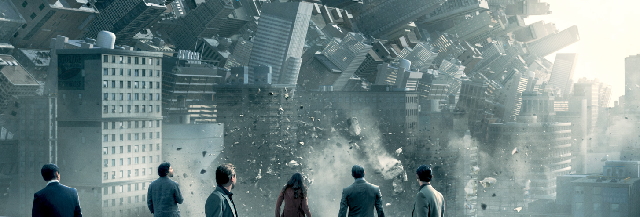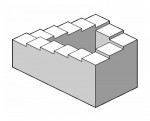
Chris Nolan’s masterpiece Inception is much more than just your regular summer blockbuster, full of gunfights (there are plenty), explosions (there are a few), and ground breaking special effects (they abound) – it’s a thought-provoking investigation into the nature of dreams and the subconscious.
The film’s premise is that with the right skills and equipment, people can share each other’s dreams, building dreamscapes and populating them with their subconscious. While this can be put to a variety of uses, the more common one is “extraction” – a form of espionage where the subject’s subconscious is encouraged to put secret knowledge into a secure place like a safe or vault. The extracting team can then break in and steal that knowledge.
Cobb (Leonardo DiCapprio) leads a team of professional dreamthieves on a mission to do the reverse: to plant a thought that will change the subject’s behaviour in a specific way. This is a much harder task as it must be done in such a way that the subject believes it is their own idea, and not something foreign which can be rejected.
Of course, the difficulty is compounded because Cobb brings personal problems to the job. These problems can’t be avoided and will have a very profound effect on Cobb and everybody else in the dreamscape around him.
This is your spoiler warning: I intend to discuss some specifics beyond the jump.
Building a world… literally
One of the most impressive things about Inception is that it’s not an existing IP; it’s all entirely original, based on Chris Nolan’s personal interest and research. According to the Wikipedia entry for the movie, Nolan has toyed with the idea since his teenage years, and originally pitched the idea to the studios in 2001. The fact that he held back and continued to develop it really shows in the perfection of the movie.
I don’t think Inception would have succeeded as a horror flick (Nolan’s original idea). I saw that once upon a time, and I think that it’s such an obvious use of dream manipulation that you wouldn’t really want to be competing with established franchises like Nightmare on Elm Street (which has recently been rebooted).  Instead, the heist genre allows the audience to meet a team of experienced dream manipulators that can explain their roles in an relaxed way before hurtling into the actual “job”.

Obviously the Architect is the most crucial role, both because Cobb was a great Architect before his complications set in, and because the act of world building is the most visually spectacular element of the film. The ability to build physically impossible constructs like the Penrose stairs, and to bend geography back on itself makes for great moments on screen, as well as strong and subtle plot points.
Somnupunk
I don’t know if it could possible establish a subculture in the vein of cyberpunk or steampunk, but in terms of a literary genre, I do feel that Inception lends critical mass to the creation of “somnupunk”. Much like cyberpunk, the film explores the nature and implications of programmable reality. However, rather than that programmable reality be either in computers or cybernetic body modification, it works in the dream world.
Inception is obviously influenced by the Matrix, but I also felt that Cobb’s relationship with his dead wife felt like the portions of William Gibson’s Neuromancer where Case is flatlined and spends an apparently endless time in a fantasy with an old dead lover on a deserted beach, devised by an AI to distract him from his mission.
With both box office and critical success, I believe Nolan has inspired people to expand on an idea which, although not brand new, hasn’t seen mainstream treatment in quite a while.